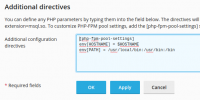Wolfgang Reidlinger
Basic Pleskian
Hi there!
Does anyone know this warning message and can help me to fix it.

Nextcloud version is up-to-date.
OS: Ubuntu 20.04.3 LTS
Product: Plesk Obsidian 18.0.38 Update #2
Does anyone know this warning message and can help me to fix it.

PHP does not seem to be setup properly to query system environment variables. The test with getenv("PATH") only returns an empty response. Please check the installation documentation ↗ for PHP configuration notes and the PHP configuration of your server, especially when using php-fpm.
Nextcloud version is up-to-date.
OS: Ubuntu 20.04.3 LTS
Product: Plesk Obsidian 18.0.38 Update #2


